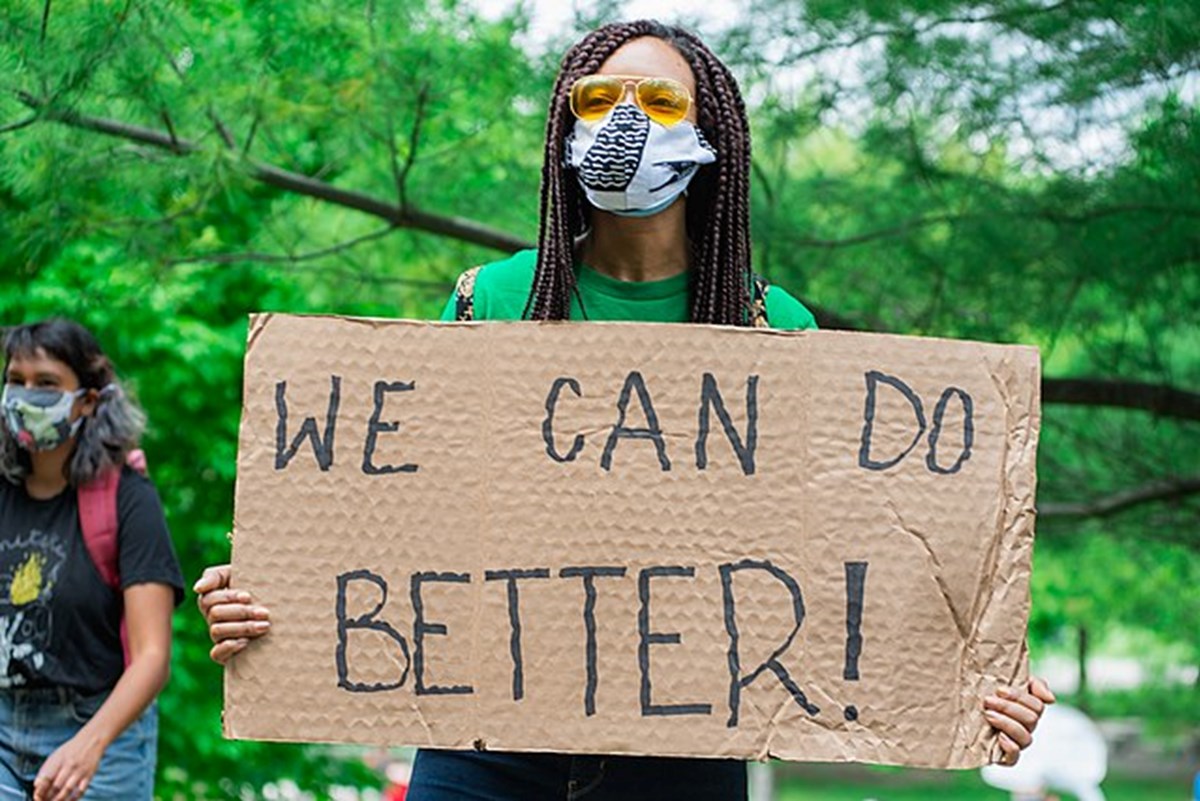This moment was long in the making. From slavery, to Jim Crow, to the Civil Rights struggles of the last century, to the ongoing struggle to overcome racism today—these formed the foundations of the fear, frustration, and discontent in America’s black community.
Disproportionate police brutality against black people pervades this history. Fuel for the fires we face today came from these past troubles, and the failure to overcome their vestiges built up a powder keg, primed by the frustrations and anxieties of a global pandemic and an economic shutdown.
The viral video of George Floyd dying under the knee of a Minneapolis police officer was the spark.
People have poured into the streets demanding justice and change, in protests that have spread like wildfire across not only the United States, but the world.
Here many people of every background have come together in spontaneous demonstrations of varying character, evoking imagery of the Civil Rights movement perhaps remembered best for Dr. Martin Luther King Jr.’s powerful words and nonviolent methods to expose and fight racial barriers. If we are to invoke MLK’s name, then we’d do well to remember one important point as we consider tactics and organization…
Rioting and looting are inexcusable, and are, emphatically, not productive protest.
We’ve all seen the shattered glass, broken doors, cars and buildings ablaze, graffiti everywhere—perhaps even in your own community. Some protesters, though, say this is to be excused for the transgressions endured by marginalized populations. That we should refuse to even speak their names—rioting and looting—in favor of "rebellion" or “revolution.”
No matter that these businesses are often minority-owned. That, regardless of race, they represent hard work, savings, blood, sweat, and tears—not to mention employment for the community. And they’re not all coming back, insurance or no.
Raiding the shoe store, burning down restaurants, smashing and burning everything around you aren’t rebellion. It's riot. Riot incited by those who just want to loot, stoking the passions of the otherwise peaceful, and turning away the otherwise allied. To join them is a choice—and the easy choice, at that. If you want to downplay this, know that I am not on your side.
Happily, most protesters are not rioters. Let's make that clear. I am on their side.
Some have taken to quoting MLK on riots as the "the language of the unheard," of the oppressed and downtrodden. Let's be crystal clear then, as well, about his thoughts on the matter, as fully expressed in his "The Other America" speech from 1967. His entire point in the relevant section was that riots are counterproductive—but that we must recognize the grievances over injustice expressed in them, the violent conditions suffered that create them. Some seem to leave out the counterproductive bit, and others the injustice bit.
Specifically, he said:
“...riots are socially destructive and self-defeating. I'm still convinced that nonviolence is the most potent weapon available to oppressed people in their struggle for freedom and justice. I feel that violence will only create more social problems than they will solve.”
Lest you think this is to deny the reality of brutal injustice that often feeds such a response, he finished these remarks with a bit of prescience:
“And as long as America postpones justice, we stand in the position of having these recurrences of violence and riots over and over again.”
So here we are, many cycles of riots later, from (ironically) the King assassination riots, to Stonewall; from the 1980 Miami riots, to the L.A. Rodney King riots; from Ferguson, to the current conflagration.
Stonewall, I’ll note, demonstrates that this is not peculiar to racial oppression. That fight for recognition, for legal and social equality for LGBT people, follows the same logic. What logic is that? The logic Dr. King laid out when, perhaps inspired by the Gospel of Matthew, he said:
“The ultimate weakness of violence is that it is a descending spiral begetting the very thing it seeks to destroy, instead of diminishing it, it multiplies it. Through violence you may murder the liar, but you cannot murder the lie, nor establish the truth. Through violence you may murder the hater, but you do not murder hate. In fact, violence merely increases hate. Returning violence for violence multiplies violence, adding deeper darkness to a night already devoid of stars.”
Though some good may follow a violent riot, such as awareness of the desperate issues which inspired it, the good comes in spite of it, and never because of it.
History is a witness to countless iterations of this lesson. These riots were largely sparked by violence done to the rioters, with specific flash points. But where then is the lasting change from any of the above listed? Only in the instances succeeded by clear organization pursuing specific goals, using a range of nonviolent measures and legislative action.
For the black community, it’s that part that’s been missing for a long time. Understanding the origins of these systemic issues in our criminal justice institutions, legal frameworks, judicial doctrines, etc. is vital to distilling the message that black lives are being systematically devalued, and that black lives matter.
Police unions, qualified immunity, unjust laws criminalizing peaceful activity and voluntary enterprise, plus denial of opportunity through barriers to entry in legal market competition… All these issues are suddenly on the lips of people having these conversations in a meaningful way. At last, we have a chance to forge this rage into real change—if we choose to. Looting and rioting, no matter the source, must be condemned so that we may reach those who need to be reached, to bring about the changes we seek.
And what violence may this violence beget, in an age of militarized police? The total violence of the state.
We’d do well to remember King’s example, and focus on building this energy from the peaceful majority of protests into real, lasting change—for all of our lives, yes, but particularly for the black lives so threatened by a broken social order.
Where do we go from here? I won’t pretend to have all the answers. No one can. But here’s a starting point: organize, formally, around specific causes. This is a complex matter, and we each have different causes under this umbrella that we care about; the pain is real but can’t be addressed until the points are thought out and articulated. I’d like to begin with these six points:
- End qualified immunity. If the Supreme Court won’t, it can be done with legislation, like Congressman Justin Amash’s bluntly named End Qualified Immunity Act. If police face no consequences, there is no accountability.
- Stop subsidizing police abuse by putting the taxpayer on the line for payouts. Like any other professional facing these kinds of risks based on their actions, police should carry liability insurance. As their risk increases, so too would the cost of insuring them. Should they persist and continue to abuse, harass, etc., they’d become uninsurable, and thus unemployable.
- End the drug war, end sex work prohibitions, and the general criminalization of peaceful commerce. The fewer points of contact needed with the police, the better for all parties. The essence of police work is legitimate force, so let them focus on where that force needs to be applied (murderers, rapists, etc.) and let us hold them accountable.
- Demilitarize the police. Military equipment is looking for a military response. Cops aren’t soldiers, and we’re not enemy combatants.
- Empower independent, non-police investigators for allegations of police misconduct.
- Create a database of decertified officers. The insurability mentioned above provides a good incentive structure, but it should also be clear to every police force that officers who lost their jobs for these reasons are not to be rehired in a new city.
The old song said, “We shall overcome.” I’d prefer to say that we can overcome, if we choose to. But it’s going to take hard work and thoughtfulness that riots—understandable though their underlying fury might be—threaten in every way.

